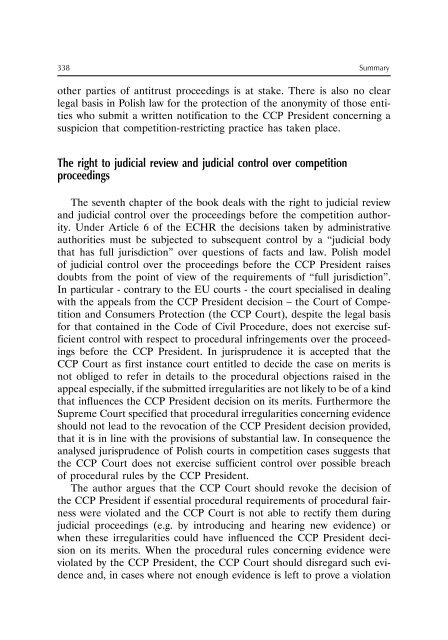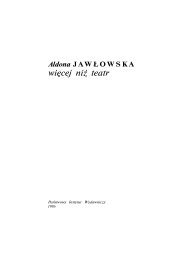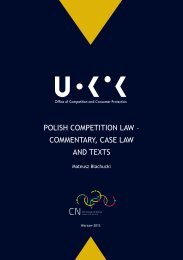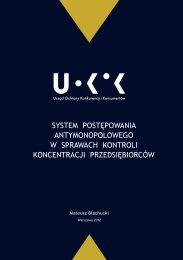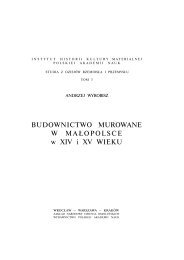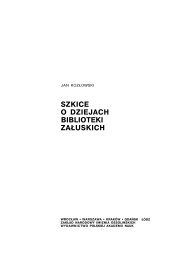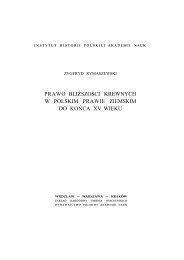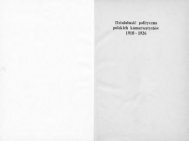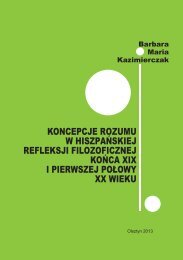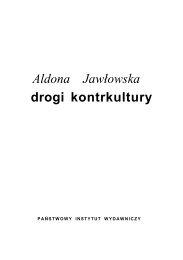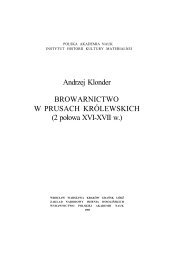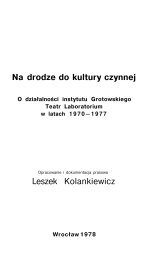- Page 3 and 4:
Maciej BernattSprawiedliwość proc
- Page 5:
Moim najbliższym
- Page 9 and 10:
Szczegółowy spis treściWykaz skr
- Page 11 and 12:
Szczegółowy spis treści 113.5.6.
- Page 13 and 14:
Szczegółowy spis treści 136.3.3.
- Page 15 and 16:
Wykaz skrótówCMLR - Common Market
- Page 17 and 18:
Od AutoraW książce postawiłem so
- Page 19:
Od Autora 19Publikacja oparta jest
- Page 22 and 23:
22 ROZDZIAŁ 1.konkurencja na rynku
- Page 24 and 25:
24 ROZDZIAŁ 1.czesnych społeczeń
- Page 26 and 27:
26 ROZDZIAŁ 1.z tego powodu, że P
- Page 28 and 29:
28 ROZDZIAŁ 1.Administracyjnego).
- Page 30 and 31:
30 ROZDZIAŁ 1.względu na konieczn
- Page 32 and 33:
32 ROZDZIAŁ 2.uporządkowanej stru
- Page 34 and 35:
34 ROZDZIAŁ 2.równości 49 . W ko
- Page 36 and 37:
36 ROZDZIAŁ 2.Spojrzenie na sprawi
- Page 38 and 39:
38 ROZDZIAŁ 2.jako takiego, będą
- Page 40 and 41:
40 ROZDZIAŁ 2.Trzecim rodzajem spr
- Page 42 and 43:
42 ROZDZIAŁ 2.pić, lecz nie musi
- Page 44 and 45:
44 ROZDZIAŁ 2.Zygmunt Ziembiński
- Page 46 and 47:
46 ROZDZIAŁ 2.łączy w sobie funk
- Page 48 and 49:
48 ROZDZIAŁ 2.powinno wpływać na
- Page 50 and 51:
50 ROZDZIAŁ 2.jako wartość proce
- Page 52 and 53:
52 ROZDZIAŁ 2.z wartościami, maj
- Page 54 and 55:
54 ROZDZIAŁ 2.wyodrębniono cztery
- Page 56 and 57:
56 ROZDZIAŁ 2.bezpośrednio związ
- Page 58 and 59:
58 ROZDZIAŁ 2.wysłuchania ma char
- Page 60 and 61:
60 ROZDZIAŁ 2.ścią sprawiedliwo
- Page 62 and 63:
62 ROZDZIAŁ 2.postępowania przed
- Page 64 and 65:
64 ROZDZIAŁ 2.rozwiązania prawne
- Page 66 and 67:
66 ROZDZIAŁ 2.Jeżeli chodzi o kla
- Page 68 and 69:
68 ROZDZIAŁ 2.nia 1984 r. w sprawi
- Page 70 and 71:
70 ROZDZIAŁ 2.2.2.2.3. Możliwoś
- Page 72 and 73:
72 ROZDZIAŁ 2.Prawo do rzetelnego
- Page 74 and 75:
74 ROZDZIAŁ 2.gość postępowania
- Page 76 and 77:
76 ROZDZIAŁ 2.skiej 294 . Jest ono
- Page 78 and 79:
78 ROZDZIAŁ 2.Wypracowane w orzecz
- Page 80 and 81:
80 ROZDZIAŁ 2.macji żądanych od
- Page 82 and 83:
82 ROZDZIAŁ 2.2.2.4. Klauzula proc
- Page 84 and 85:
84 ROZDZIAŁ 2.w rozstrzygnięciu o
- Page 86 and 87:
86 ROZDZIAŁ 2.Podobnie działania
- Page 88 and 89:
88 ROZDZIAŁ 2.nia” 382 . Zarazem
- Page 90 and 91:
90 ROZDZIAŁ 2.11 kpa). Ważny jest
- Page 92 and 93:
92 ROZDZIAŁ 2.procesu może się d
- Page 94 and 95:
94 ROZDZIAŁ 2.organem wyposażonym
- Page 96 and 97:
96 ROZDZIAŁ 2.sposobu udostępnian
- Page 98 and 99:
98 ROZDZIAŁ 2.inne informacje posi
- Page 100 and 101:
100 ROZDZIAŁ 3.Celem rozdziału je
- Page 102 and 103:
102 ROZDZIAŁ 3.nieuregulowanym w u
- Page 104 and 105:
104 ROZDZIAŁ 3.zarzutów, mogą by
- Page 106 and 107:
106 ROZDZIAŁ 3.zjach Prezesa UOKiK
- Page 108 and 109:
108 ROZDZIAŁ 3.oraz wyjaśniać, j
- Page 110 and 111:
110 ROZDZIAŁ 3.2003 r. SOKiK stwie
- Page 112 and 113:
112 ROZDZIAŁ 3.praktyk ograniczaj
- Page 114 and 115:
114 ROZDZIAŁ 3.kurencji 465 . W wy
- Page 116 and 117:
116 ROZDZIAŁ 3.W prawie UE dostrze
- Page 118 and 119:
118 ROZDZIAŁ 3.nie udostępnione 4
- Page 120 and 121:
120 ROZDZIAŁ 3.Ostateczną reguł
- Page 122 and 123:
122 ROZDZIAŁ 3.Zagwarantowanie wys
- Page 124 and 125:
124 ROZDZIAŁ 3.ograniczoną wiedz
- Page 126 and 127:
126 ROZDZIAŁ 3.Ł. Błasz czaka,
- Page 128 and 129:
128 ROZDZIAŁ 3.nia w sposób wycze
- Page 130 and 131:
130 ROZDZIAŁ 3.i konsumentów - w
- Page 132 and 133:
132 ROZDZIAŁ 3.Artykuł 75 kpa int
- Page 134 and 135:
134 ROZDZIAŁ 3.jednak w takim przy
- Page 136 and 137:
136 ROZDZIAŁ 3.Komisji oraz organo
- Page 138 and 139:
138 ROZDZIAŁ 3.oceniam brak obowi
- Page 140 and 141:
140 ROZDZIAŁ 3.nia, powinien dopu
- Page 142 and 143:
142 ROZDZIAŁ 3.Powołanie się na
- Page 144 and 145:
144 ROZDZIAŁ 3.Urzędnik ds. wysł
- Page 146 and 147:
146 ROZDZIAŁ 3.jest zwłaszcza, ż
- Page 148 and 149:
148 ROZDZIAŁ 3.ukaranym dwa razy z
- Page 150 and 151:
150 ROZDZIAŁ 3.zaliczeniu w poczet
- Page 152 and 153:
152 ROZDZIAŁ 3.5. Prawo do wysłuc
- Page 154 and 155:
154 ROZDZIAŁ 4.interesów tych pod
- Page 156 and 157:
156 ROZDZIAŁ 4.W postępowaniu prz
- Page 158 and 159:
158 ROZDZIAŁ 4.jest możliwy na po
- Page 160 and 161:
160 ROZDZIAŁ 4.naruszających zbio
- Page 162 and 163:
162 ROZDZIAŁ 4.konkurencji i konsu
- Page 164 and 165:
164 ROZDZIAŁ 4.nie musi być uzale
- Page 166 and 167:
166 ROZDZIAŁ 4.sumentów obowiązk
- Page 168 and 169:
168 ROZDZIAŁ 4.w stosunku do innyc
- Page 170 and 171:
170 ROZDZIAŁ 4.Instytucja ochrony
- Page 172 and 173:
172 ROZDZIAŁ 4.nienia tych informa
- Page 174 and 175:
174 ROZDZIAŁ 4.zapoznanie się z c
- Page 176 and 177:
176 ROZDZIAŁ 4.interesu. De lege f
- Page 178 and 179:
178 ROZDZIAŁ 5.lenia wyjaśnień,
- Page 180 and 181:
180 ROZDZIAŁ 5.Europejski Trybuna
- Page 182 and 183:
182 ROZDZIAŁ 5.możliwością nał
- Page 184 and 185:
184 ROZDZIAŁ 5.zanie celu żądani
- Page 186 and 187:
186 ROZDZIAŁ 5.rencji i Konsument
- Page 188 and 189:
188 ROZDZIAŁ 5.nie jest uzależnio
- Page 190 and 191:
190 ROZDZIAŁ 5.sądowego. Przemawi
- Page 192 and 193:
192 ROZDZIAŁ 5.kontrolowanego i os
- Page 194 and 195:
194 ROZDZIAŁ 5.W polskim prawie oc
- Page 196 and 197:
196 ROZDZIAŁ 5.Kolejną istotną k
- Page 198 and 199:
198 ROZDZIAŁ 5.wyjaśniającego) n
- Page 200 and 201:
200 ROZDZIAŁ 5.w toku kontroli uzn
- Page 202 and 203:
202 ROZDZIAŁ 5.w postępowaniu wyj
- Page 204 and 205:
204 ROZDZIAŁ 5.obecnej praktyki -
- Page 206 and 207:
206 ROZDZIAŁ 5.powania i postawy k
- Page 208 and 209:
208 ROZDZIAŁ 5.5.4.2. Przeszukanie
- Page 210 and 211:
210 ROZDZIAŁ 5.troli bądź na sku
- Page 212 and 213:
212 ROZDZIAŁ 5.wania wyjaśniając
- Page 214 and 215:
214 ROZDZIAŁ 5.dopodobnie rzadko w
- Page 216 and 217:
216 ROZDZIAŁ 5.zastosować w przyp
- Page 218 and 219:
218 ROZDZIAŁ 5.być usprawnienie d
- Page 220 and 221:
220 ROZDZIAŁ 5.nie, ze względu na
- Page 222 and 223:
222 ROZDZIAŁ 5.jącego uprzedniego
- Page 224 and 225:
224 ROZDZIAŁ 5.jednak prawa do dok
- Page 226 and 227:
226 ROZDZIAŁ 5.w art. 105c ust. 1
- Page 228 and 229:
228 ROZDZIAŁ 5.przeszukaniem prowa
- Page 230 and 231:
230 ROZDZIAŁ 5.tajemnicy porady pr
- Page 232 and 233:
232 ROZDZIAŁ 5.Komisją a kontrolo
- Page 234 and 235:
234 ROZDZIAŁ 5.kacką u przedsięb
- Page 236 and 237:
236 ROZDZIAŁ 5.1. Zastrzeżenie bu
- Page 238 and 239:
238 ROZDZIAŁ 5.się (oczywiście p
- Page 240 and 241:
240 ROZDZIAŁ 6.W postępowaniu prz
- Page 242 and 243:
242 ROZDZIAŁ 6.ochronie na podstaw
- Page 244 and 245:
244 ROZDZIAŁ 6.szczególnej ostro
- Page 246 and 247:
246 ROZDZIAŁ 6.cji i ich pracownik
- Page 248 and 249:
248 ROZDZIAŁ 6.Prawo UE dokonuje r
- Page 250 and 251:
250 ROZDZIAŁ 6.być na gruncie pos
- Page 252 and 253:
252 ROZDZIAŁ 6.tej zasady 1066 . D
- Page 254 and 255:
254 ROZDZIAŁ 6.riału dowodowego u
- Page 256 and 257:
256 ROZDZIAŁ 6.Podkreślić jednak
- Page 258 and 259:
258 ROZDZIAŁ 6.cji nie mogą stać
- Page 260 and 261:
260 ROZDZIAŁ 6.przedsiębiorstwa g
- Page 262 and 263:
262 ROZDZIAŁ 6.i gwarantowanie wys
- Page 264 and 265:
264 ROZDZIAŁ 7.czyniać się do ni
- Page 266 and 267:
266 ROZDZIAŁ 7.konkurencji, przyj
- Page 268 and 269:
268 ROZDZIAŁ 7.zasługuje zwłaszc
- Page 270 and 271:
270 ROZDZIAŁ 7.ciałem politycznym
- Page 272 and 273:
272 ROZDZIAŁ 7.UOKiK, który na je
- Page 274 and 275:
274 ROZDZIAŁ 7.cia niezależnemu i
- Page 276 and 277:
276 ROZDZIAŁ 7.Sądy UE tradycyjni
- Page 278 and 279:
278 ROZDZIAŁ 7.podejścia do tego
- Page 280 and 281:
280 ROZDZIAŁ 7.toryjnym, w którym
- Page 282 and 283:
282 ROZDZIAŁ 7.cyjne 1200 . Wskazy
- Page 284 and 285:
284 ROZDZIAŁ 7.prowadziła Komisja
- Page 286 and 287:
286 ROZDZIAŁ 7.SOKiK „nie może
- Page 288 and 289: 288 ROZDZIAŁ 7.łoby się wyjaśni
- Page 290 and 291: 290 ROZDZIAŁ 7.stracyjnego, nieroz
- Page 292 and 293: 292 ROZDZIAŁ 7.na podstawie art. 4
- Page 294 and 295: 294 ROZDZIAŁ 7.nym do tych, jakie
- Page 296 and 297: 296 ROZDZIAŁ 7.śniej wskazywała
- Page 298 and 299: 298 ROZDZIAŁ 7.do uchylenia decyzj
- Page 300 and 301: 300 ROZDZIAŁ 7.nia decyzji Prezesa
- Page 302 and 303: 302 ROZDZIAŁ 7.Prezesa UOKiK wyzna
- Page 304 and 305: 304 ROZDZIAŁ 7.rozważyć wiarygod
- Page 306 and 307: 306 ROZDZIAŁ 7.oceny przez organ a
- Page 308 and 309: 308 ROZDZIAŁ 7.listycznych nie mo
- Page 310 and 311: 310 ROZDZIAŁ 7.resów, szczególni
- Page 312 and 313: 312 ROZDZIAŁ 7.materiału dowodowe
- Page 314 and 315: 314 ROZDZIAŁ 7.z urzędu zmierzał
- Page 316 and 317: 316 ROZDZIAŁ 7.zję co do istoty w
- Page 318 and 319: 318 ROZDZIAŁ 7.łanym postanowieni
- Page 320 and 321: 320 ROZDZIAŁ 7.Punktem odniesienia
- Page 322 and 323: 322 ROZDZIAŁ 7.gdy jej wydanie nas
- Page 324 and 325: 324 ROZDZIAŁ 8.badań były więc
- Page 326 and 327: 326 ROZDZIAŁ 8.ochrony konkurencji
- Page 328 and 329: 328 ROZDZIAŁ 8.8.5. Prawo do ochro
- Page 330 and 331: 330 ROZDZIAŁ 8.pomijał takie dowo
- Page 332 and 333: 332 ROZDZIAŁ 8.ETPCz na naruszenia
- Page 334 and 335: 334 Summarycompetition, and antimon
- Page 336 and 337: 336 SummaryThe general principles o
- Page 341 and 342: Lista orzeczeń i decyzjiOrzecznict
- Page 343 and 344: Lista orzeczeń i decyzji 343Wyrok
- Page 345 and 346: Lista orzeczeń i decyzji 345Postan
- Page 347 and 348: Lista orzeczeń i decyzji 347Wyrok
- Page 349 and 350: Lista orzeczeń i decyzji 349Sprawa
- Page 351 and 352: Lista orzeczeń i decyzji 351Sprawa
- Page 353 and 354: Lista orzeczeń i decyzji 353Wyrok
- Page 355 and 356: Lista orzeczeń i decyzji 355Wyrok
- Page 357 and 358: Akty prawneKonwencja o ochronie pra
- Page 359: Akty prawne 359Biała Księga w spr
- Page 362 and 363: 362 BibliografiaBernatt M., Prywatn
- Page 364 and 365: 364 BibliografiaEhlermann C.D., Dri
- Page 366 and 367: 366 BibliografiaJelenkowska-Luca E.
- Page 368 and 369: 368 BibliografiaKrzyżanowska-Mierz
- Page 370 and 371: 370 BibliografiaPoklewski-Koziełł
- Page 372 and 373: 372 BibliografiaTaras W., Prawny ob
- Page 374 and 375: 374 Notatki
- Page 376 and 377: 376 Notatki
- Page 378: Dotychczasowe publikacje Programu W


